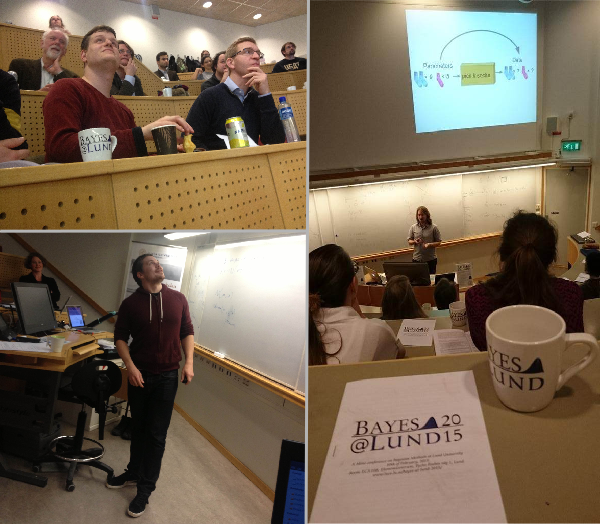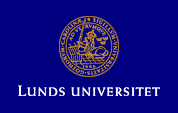Bayes@Lund 2015 is over and the organizers would like to thank everybody that presentated and participated for making this conference a success! We hope to see you again at Bayes@Lund 2016 and in the meantime you can sign up for the Bayes@Lund mailing list for information regarding activities related to Bayesian modeling at LU. Rasmus Bååth has also written an informal summary of Bayes@Lund here.
/ Rasmus Bååth, Ullrika Sahlin, Krzysztof Podgorski and Paul Caplat


Following the success from last year we are happy to present the sequel: Bayes@Lund 2015. The purpose of this conference is to bring together researchers working with or interested in Bayesian methods. The focus will be on how Bayesian methods are used in research, what advantages Bayesian methods have over classical alternatives, and how the use and teaching of Bayesian methods can be encouraged.
This year we are happy to announce that the invited speaker is Mattias Villani. He is Professor of Statistics at the Division of Statistics and Machine Learning at the Department of Computer and Information Science (IDA), Linköping University. His research focuses on developing Bayesian methods for inference and prediction using flexible models. Mattias is going to talk about: Bayesian model inference – why, what and how?. The slides from his presentation are availlable here.
Practical Bayesian work is based on probability models for the data. In most real-world problems there is uncertainty about the correct model to use, and more than one model is typically under consideration. I will introduce the basics of Bayesian model inference, including model comparison and model averaging. Methods for implementing Bayesian model inference will be briefly discussed. I will also raise concerns about Bayesian model inference, and criticise the way this theory is used in a large portion of practical applications.
As last year the conference will also include a number of short contributed talks. New for this year is that in connection to the conference there will also be a hands on session which will introduce Bayesian Hierarchical Modeling.
Conference registration
Unfortunately the registration has closed as the conference has been very popular and is unfortunately full.
Important Dates
Final date for registration: 8 February
The conference: 10 February
Location
Room EC3:108, Ekonomicentrum, Tycho Brahes väg 1, Lund.
The pre-conference hands on session is also held in room EC3:108.
Program
Click here to download the full program, including abstracts of all the talks.
09.15–11.00 Pre-conference hands on session Introduction to Bayesian Hierarchical Modelling. (In room EC3:108) Click here to download the hands-on example files
11.15–12.30 Welcome & Session 1: Foundations, Pedagogy and Pollen
– Bayes from a frequentist point of view, Krzysztof Podgorski, Departement of Statistics, Lund University
– Teaching Bayesian data analysis in psychology, Geoffrey R. Patching, Department of Psychology, Lund University
– Lindley’s paradox, Bengt Ringnér, Mathematical Statistics, Lund University
– Pollen based spatial reconstruction of past land cover, Behnaz Pirzamanbin et al., Mathematical Statistics, Lund University
12.30–13.15 Sandwich Lunch in the lobby (free, but registration is required)
13.15–14.15 Keynote speaker: Mattias Villani, Linköping University – Bayesian model inference – why, what and how?
14.30–15.45 Session 2: Computation, Cells and Socks
– Tiny data, approximate Bayesian Computation and the socks of Karl Broman, Rasmus Bååth, Lund University Cognitive Science
– Data-Cloning ABC for (approximate) maximum likelihood estimation, Umberto Picchini, Mathematical Statistics, Lund University
– Joint cell population identification through Bayesian hierarchical modeling, Kerstin Johnsson, Centre for Mathematical Sciences, Lund University
– Distributing a collapsed sampler for topic models, Måns Magnusson et al., Lindköping Universit
15.45–16.15 Coffee and Cake
16.15–17.30 Session 3: Belief, Money and the Moose Population
– Estimation of local moose population using Bayesian hierarchical modelling, Jonas Wallin, Matematiska vetenskaper, Chalmers
– Performance of Bayesian prediction of treatment differences using a two-factor linear mixed-effects model, Johannes Forkman, SLU
– Bayesian estimation of optimal portfolio, Stepan Mazur, Department of Statistics, Lund University
– How Bayesian belief networks can help save the world, Ullrika Sahlin, Centre for Environmental and Climate Research, Lund University
The post-conference discussion will be held at restaurant Ha Long (Östra Mårtensgatan 19).
For more info, contact
Rasmus Bååth, Lund University Cognitive Science, Department of Philosophy: rasmus.baath [at] lucs.lu.se
Ullrika Sahlin, Lund University Centre of Environmental and Climate Research: ullrika.sahlin [at] cec.lu.se
If you want to get notified of other events at Lund University that relates to Bayesian methods consider subscribing to the Bayes@Lund mailing list at http://www.lucs.lu.se/bayes/
Acknowledgement
The organizing comitee of this year’s Bayes@Lund consists of:
- Ullrika Sahlin at Lund University Centre of Environmental and Climate Research
- Rasmus Bååth at Lund University Cognitive Science
- Krzysztof Podgorski at Department of Statistics
- Paul Caplat at Lund University Centre of Environmental and Climate Research
We are deeply grateful to the Department of Statistics, School of Economics and Management for financial support of this event!


